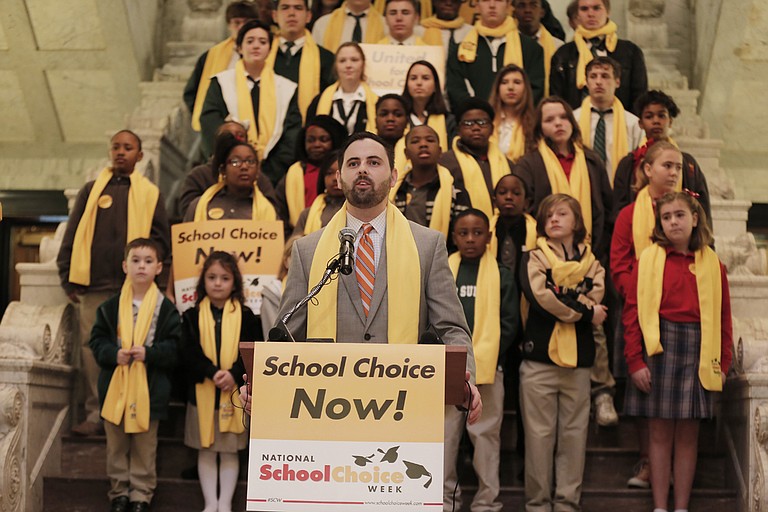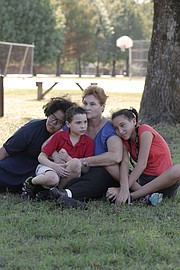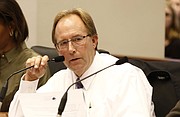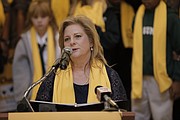Grant Callen, president of “school choice” advocacy group Empower Mississippi, speaks before a crowd at the Capitol at the beginning of National School Choice Week in February. Photo by Imani Khayyam.
Wednesday, October 5, 2016
In February, while visiting her sick mother at a local hospital, Kenna Kast decided to check in with her grandson's therapists.
Jacob, 9, is autistic and severely developmentally disabled. Kast used to accompany him by bus to his weekly therapy sessions at the University of Mississippi Medical Center in Lexington, 10 miles from their home in Durant. But she was relieved of the duty when Jacob graduated from his Head Start preschool program and enrolled in a Durant Public School District elementary school.
As part of his exceptional-education program at the new school, Jacob was still entitled to continue his weekly therapy sessions. His school was supposed to provide transportation.
So Kast decided on that February day that it would be nice to say hello to Jacob's caseworker and see how he was doing.
But the nurse she met was evasive, Kast said, encouraging her to direct her questions about her grandson to a nurse higher up in the department.
Kast said when she finally asked the nurse in charge how Jacob had been doing, the nurse told her she would have a better idea— if his school would actually bring him.
"I beg your pardon?" Kast asked.
The nurse pulled out her grandson's hospital attendance log. Out of 14 scheduled visits, dating from October 2014 to June 2015, the hospital counted Jacob as a "no show" for nine of them.
Public-school Failures
Kast has a long history of distrust with the district, alleging physical and verbal abuse and racial discrimination against her grandchildren by teachers there—her grandchildren are all half-black, and Kast is white. Legal representation for the school district told the Jackson Free Press they have investigated her charges and do not believe they are valid, or that the school districts or employees are discriminating against Kast or her grandchildren.
Jacob's older sister and cousin now attend Old Dominion Christian School, a private Christian school 20 miles away in Kosciusko, where the girls say they are happy. Kast says she, her two daughters and her own mother pool resources to cover the tuition at the school.
But her grandson presents a more difficult challenge. Kast says she would love to enroll him at Old Dominion, but the school does not have a exceptional-education program.
Most private schools in the state don't. Neither are they required to.
Private School Review, a website that vets private schools, says that the state has 250 private schools. Out of these, the Mississippi Association of Independent Schools, or MAIS, reports that it lists just over 80 schools in its directory. In addition, the Mississippi Department of Education accredits 68 non-public school programs. Twenty-two of the MDE-accredited schools are programs focused solely on serving children with exceptional needs, or have exceptional-education programs in addition to their general curricula. Some MAIS schools may have teachers or therapists trained to work with students with exceptional needs, but there is no way of knowing how many because the State doesn't track it.
This did not stop Mississippi legislators from passing the Equal Opportunity for Students with Special Needs Act in 2015, creating "educational savings accounts," commonly known as vouchers, available to students with exceptional needs who have Individual Education Programs (often called IEPs), to help families afford the cost of attending a private school that may or may not be able to serve them.
With $6,500 at their disposal, students who qualify may use the funds for a variety of education-related needs, including tuition, a tutor or textbooks. Before, the state already had two voucher programs: the 2012 Dyslexia Therapy Scholarship for Students with Dyslexia Program, and in 2013, the Speech-Language Therapy Scholarship for Students with Speech-Language Impairments.
Backers of the legislation wanted to prevent students like Jacob from falling through the cracks in the state's public-school system, where many districts are struggling with funding shortfalls. But the law's impact may be small if families who turn to private schools find themselves facing the same problems in the independent and parochial school system: few choices and limited resources.
The new Special Needs Act has set aside more than $3 million in state-funded vouchers for about 430 of Mississippi's roughly 60,000 students with disabilities. By January, the Mississippi Department of Education had approved vouchers for 286 students, yet had only reimbursed 131 of those because parents could not find schools that would accept their children.
Gretchen Cagle, director of special education at MDE, says this is common for applicants who try to use vouchers at private schools that do not exclusively serve exceptional-needs students. And unlike the dyslexia and speech scholarships, which stipulate that private schools must have licensed dyslexia and speech-language therapists before they can accept those funds, the special-needs legislation does not require private schools to have exceptional-education specialists or services.
"That's definitely been one of the challenges for the families using the education scholarship account, is finding a school that will admit their child," Cagle told the Jackson Free Press. "Some with milder disabilities have an easier time, but even once you get into those private settings, they have a limited number of spots."
"Because we're independent, there's not a special-education requirement," MAIS Executive Director Shane Blanton told the Jackson Free Press. "At most independent schools around the nation, there's not per se special education—that's a public mandate, and we're independent schools."
A 'Blessed' Coast School
Sister Mary Jo Mike, who leads Nativity of the Blessed Virgin Mary Elementary School in Biloxi, has a certified exceptional-education teacher on staff. It is the only school out of 14 in the Catholic Diocese of Biloxi with a exceptional-education teacher that offers a program serving a range of student disabilities.
"Some of the other schools have some services available, but of the Catholic schools in our diocese, we have the most complete program available," she told the Jackson Free Press.
Sister Mike says a generous family set up a trust fund more than 30 years ago to provide for exceptional-ed services in the school. "The donors, as they put it, were financially available to provide for their child, and not all families are that fortunate. Between the money from the fund and our own financial resources, and plus a little bit of state money, we are able to provide for children with exceptional needs," she said.
It is not free to go to Nativity BVM Elementary School, however. Mike said some students at the school may receive funds from the education savings account to cover tuition—more than $5,000 for non-Catholic kindergarten through sixth graders, $6,386 for pre-kindergarten students. The trust fund pays for a exceptionally trained teacher, Mike added.
Parents who look to the 22 MDE-accredited exceptional private schools may not find an option that works for their children. Two are penitentiaries. Four are hospitals. Three Mississippi Children's Home Service programs called CARES Schools primarily serve students who have IEPs for behavioral issues, and families do not pay tuition. The rest are dotted across the state and do not always provide a complete range of services for students with disabilities.
In many cases, the $6,500 stipend covers most of the cost of tuition at these MDE-accredited schools, but not all. At the New Summit Schools in Jackson and Greenwood, for instance, parents can expect to pay $7,500 and $5,100 in tuition, respectively. The Magnolia Speech School, which helps kids with communicative disorders, reports that the family portion of the school tuition is $550 to $850 a month.
The Willowood Developmental Center charges families less than $100 a week—but only serves newborns through 5-year-olds. And parents can choose to pay tuition at the states' Millcreek Schools, which serve a wide spectrum of services, at a rate of roughly $180 a day—but usually, public-school-district referrals put the onus of payment onto the school districts.
Deaf and blind students may attend the public Mississippi Schools for the Deaf and the Blind.
Private schools that aren't accredited by the Mississippi Department of Education charge a range of tuitions; high-school tuition this year at the prestigious St. Andrew's Episcopal School in Ridgeland, for instance, is $17,130—more than double this year's undergraduate student tuition at the University of Mississippi.
Grant Callen, president of Empower Mississippi, a nonprofit dedicated to "school choice" options, including vouchers and charter schools, says an experience like Kast's illustrates a range of failures on the part of public schools.
"We had heard for years just from talking to parents that simply because you have an IEP, which supposedly guarantees your child's rights to have their educational needs met, regardless of their disability, doesn't actually in practice mean you're going to have those needs met," Callen said.
Public-school districts draft IEPs in order to help identify the unique services most exceptional-needs students require in order to be successful in school. If districts cannot meet the needs of those students, the federal Individuals with Disabilities Education Act requires them to pay to have those needs met elsewhere.
Callen says some public-school districts will refuse to take diagnoses seriously in order to avoid creating an IEP for a student who will require the district to spend extra money on resources. This refusal will keep exceptional-needs students in schools and districts that cannot adequately provide for them, Callen argues.
Kast blames the Durant Public School District for not taking Jacob to his appointments. Now, the 50-year-old grandmother of three has started chaperoning him again.
"We've completely bypassed the school," she said. "I take him and bring him back myself. I don't trust them to do the right thing."
The Money Problem
Nancy Loome, executive director of the Parents' Campaign, a public-school advocacy group based in Jackson, told the Jackson Free Press in January that the schools cannot be wholly blamed for inadequate care of exceptional-needs students. She blames the Legislature.
"Schools have limited budgets. They can only spend what money they have, and when Legislatures aren't giving them the money they're due, they can't spend more than they have," Loome said. The State, she said, underfunded exceptional education in public schools in Mississippi by more than $12 million just this year. "Certainly, if the Legislature would follow the law and fund exceptional education in public schools as the law requires, schools would be able to provide more services."Mississippi has only twice fully bankrolled the Mississippi Adequate Education Program, or MAEP, the state's school-funding formula, in its near 20-year existence under state law.
Rep. John Moore, R-Brandon, the House Education Committee chairman, encouraged Republicans to pass the exceptional-education voucher legislation last year. He said the provision of the law requiring students to have recently obtained an IEP from a public-school district kept many potential applicants away. Legislators this year amended the bill to expand participation to students who have had an IEP within the last five years.
But education and disability-rights advocacy groups have a different opinion of exceptional-needs voucher programs than the state's education leadership. The National Education Association, a labor union that advocates for public education and teachers, wrote a policy brief that describes vouchers as a "scheme."
In the brief, the NEA writes that "proactive early intervention, professional development, and full funding of the Individuals with Disabilities Education Act (IDEA) are the best ways to improve the quality of education for students with disabilities, reduce the number of children inappropriately referred for exceptional education services, and provide great public schools for all children, including those with exceptional needs. We should focus on these proven strategies rather than voucher schemes that offer parents empty promises while asking them to give up federally protected civil rights."
Rep. Moore, however, sees no problem with its funding mechanism.
"It's no different than Medicaid. You take public money, and you give it to private providers; it's no difference," he said.
'Lana Will Graduate'
Pelahatchie mother Martha Beard is convinced the state law allowing public tax dollars to pay for private-school instruction may be saving her daughter Lana.
"Because of that law, we are able to send Lana to a school where she gets to receive the best resources and education available to her," Beard said, speaking before dozens of children, educators and lawmakers at the National School Choice Week Rally at the Capitol in January.
Beard said she and her husband adopted Lana at a very young age and that she was diagnosed with visual perception disorder, fetal alcohol syndrome and severe attention deficit disorder.
The disorders skewed Lana's ability to process and retain information, and made school hard for her. Homework assignments took hours, and Lana's defensiveness and frustration at the apparent ease in which her classmates navigated the classroom made it even worse.
Lana would cry and beg not to go to school in the morning.
Now at New Summit School, a private school in Jackson that offers a range of exceptional-education services, Lana is a new person, Beard says.
"She has more self-confidence," Beard said during the rally. "She's more readily able to express herself. Now she communicates outside her comfort zone. When she comes home at night, she now has the desire to do her homework for herself. She's proud of herself when she gets an A or B. She's not intimidated to ask and answer questions.""
However, little data exist to prove the effectiveness of voucher programs to improve outcomes for disabled children once they leave public schools, a June 2016 study from child disability-rights advocate group Council of Parent Attorneys and Advocates Inc. found.
Such studies mean little to Beard, though, when she sees her daughter's improvement. She acknowledges that her family still has struggles, but that she is hopeful for the future. "At New Summit, Lana will graduate," she said.
A Question of Fairness
There is no guarantee that a private school can adequately serve a child's needs simply because it is private. "When you get into the private schools, it's really their interpretation of what they consider exceptional education," Cagle of the Mississippi Department of Education told the Jackson Free Press. "With public schools, exceptional education is not a place, it's not a classroom—it's a set of services."
Cagle says that, for some people, "special education" has a specific connotation of always being able to provide for the severely disabled.
"When you say you do special ed, they might think they take the full gamut, like public schools do. Private schools have the option to pick who they allow for admission into their places, who they feel like they can serve appropriately," Cagle said.
If parents have a complaint about how a private school serves their children, they may have no recourse. Public-school students forfeit their rights to a free and appropriate public education under the federal Individuals with Disabilities Education Act if they attend certain private schools, including private religious academies, which are not usually subject to federal oversight.
Parents like having the choice to send their children to new schools anyway, regardless of their ability to serve their children, the Council of Parent Attorneys and Advocates study found.
Kast's family has ruled out a private-school education because Old Dominion, where Jacob's relatives attend school, lacks a trained exceptional-education teacher. Kast would like to enroll Jacob in another nearby school district with a reputation for a stronger exceptional-education program. But Mississippi law does not allow public-school students to attend districts in which they don't live—unless they fall under specific charter-school guidelines, have special affidavits or qualify for the Dyslexia Therapy Scholarship.
Kast still hopes the school board in Durant might release her grandson so he can attend elementary school in the Kosciusko School District. Meanwhile, Jacob is slowly making progress now that he's attending therapy again.
"I'm not giving up on Jacob," Kast said. "He's going to be somebody one day.
Sierra Mannie is an education reporting fellow for the Jackson Free Press and The Hechinger Report. Email her at [email protected].




Comments
Use the comment form below to begin a discussion about this content.
Sign in to comment
Or login with:
OpenID